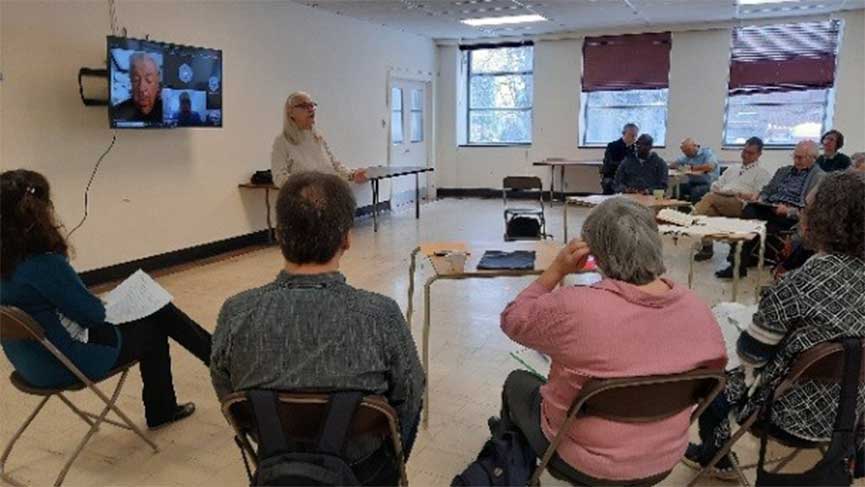Morning of reflection on the future of the diocese of Montreal’s Social Action

Montreal
On January 28, a gathering was held of approximately 30 participants from various parts of the diocese, including pastoral social action agents, parish social action representatives, members of acting committees from various districts, individuals involved in social action and priests from the Société des Missions-Étrangères du Québec. Participants took part online or in person in this group reflection on the role of social action in our diocese. Recognizing the importance of the Church’s responsibility in terms of social engagement, they set out to take a picture of the situation in the spirit of the road-building work of missionary transformation first launched in 2018, as well as taking stock of the initiatives currently under way, meanwhile reflecting on the question whether the members of the Christian communities are aware of this dimension of our faith.
The original idea for this reflection exercise was hatched among the acting committee for social action in Centre-Sud/Hochelaga-Maisonneuve. The questions discussed were, ‘Where are we going?’ and ‘Does our Church really care about upholding the values of social action and turning them into concrete works?’
Representing the diocese’s Social Action Office were Director Louise Royer (French-speaking communities) and Kim Gottfried-Piché (English Network Coordinator for English-speaking communities). They heard the cry that went up from CS-HM and, with the approval of the diocesan committee for social action, proposed and coordinated this morning of reflection.
Among those in attendance was Bishop Alain Faubert, who invited us to begin the reflection process with a reading from the Word of God, the account of that important person, the widow with her mite. The passage bears witness to Jesus’ recognition of the value of justice, a recognition that should be shared by the whole Church, particularly by means of social action and expressing the preferential option for those in vulnerable conditions who are too often subject to different forms of abuse.
At this point, Bishop Faubert recalled the vision statement for our diocese: “In Jesus Christ, let us build a life-giving Church, one that is open to being evangelized, and that is welcoming and close to people.” Following this, he shared with us some of the recently developed missionary proposal coming out of the synodal synthesis phase. He mentioned the fact, unfortunately too commonplace, that our objectives turn into mere lip service: wonderful ideas with little substance, removed from the actual realities on the ground. He proposed two avenues that in his view would be important as we move forward with our synodal process. In all the actions that we undertake for others, we ought to refer to the insights put forward by Pope Paul VI in Evangelii nuntiandi, which is to say, revealing the presence of the Kingdom of God in our world and manifesting it. Bishop Faubert then asked, ‘What are the situations today that call for enlightenment through the Gospel?’
It is important first of all to start with facts. We must know the socio-economic realities that are at play around us. This is the work of compiling statistics presently being carried out by Ms. Wendy DeSouza of the diocese. Ms. DeSouza gave a report on her data. According to these, “19% of the households in the diocese of Montreal (almost one in five) are living at a low-income level or below the poverty line. Among children zero to five years old, 20.3% (one in five) are living in low-income households, and for seniors 65 and over, 19.4% (again, almost one in five) are living at a low-income level.”
After this presentation, the group split up into smaller groups to workshop the following questions:
Is our Church making an impact on the poor here or elsewhere? For more justice, peace and care for the common home?
How is the preferential option for the poor evolving in our deanery, borough, diocese?
Does our group coordinate with other faith groups, community organizations and institutions? Which ones? What is going well? ... What can be improved?
Recommendations
The morning reflection concluded with the full group coming together again. Some concerns and observations expressed by several of those present were:
“The social fabric has come apart, and we are lacking initiatives that could bring us together to work as a collective;”
“We should have better networking among ourselves;”
“We want to show greater conformity with the Gospel that we are proclaiming;”
“We want to do more with the vulnerable in our society, not for them;”
“Give more consideration to the dimension of community and the importance of working hand in hand with people, having the humility to learn from them.”
At the end, just as we were about to leave, a number of people shared some hopeful and forward-looking thoughts, such as:
“Don’t be shy about speaking up in our parishes, explaining and describing the work of social action;”
“We want to collaborate more with one another, collectively;”
“We want to speak out more through the media and in society generally on social justice issues, as well as reporting on the good things that are being accomplished in that regard in our areas;” and last but not least:
“Let’s continue this reflection!”
Will you be there? Your pastoral social action agents will be delighted to work with you!
1 (https://microsites.diocesemontreal.org/microsites/synode/toolbox/, *see ‘6. Other tools/Demographic tools’)

Comment
Comment
Add new comment